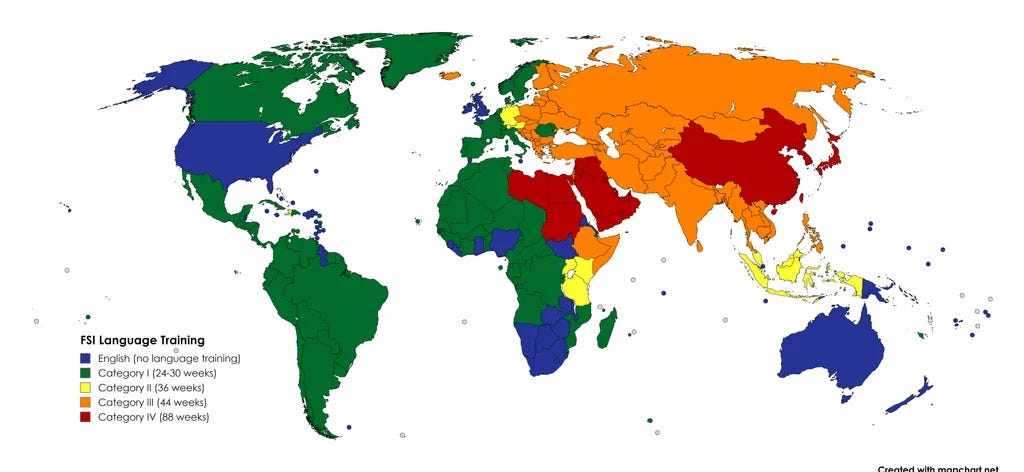Should You Learn Japanese?
It's a lifelong effort and most will inevitably give up, but that doesn't mean you still can't try.
Foreign Perspectives is a mix of free and paid content. Certain articles such as these are exclusively for paid subscribers. If you enjoy the work I do, please consider upgrading to a monthly or yearly subscription. Your support is greatly appreciated and ensures that this Substack can continue to deliver high quality pieces.
The Foreign Service Institute (FSI) is a branch of the U.S. State Department which is tasked with training American diplomats. Before taking on their responsibilities, many have to learn a foreign language in order to navigate the complex challenges of international affairs. On the FSI website, each language is ranked from Category I to Category IV. The former consists of languages closest to English like French and Italian which take 24-30 weeks of intense study to reach a basic level of fluency. The latter are languages about as far removed from English as one can get, taking a whopping 88 weeks of study. Japanese happens to be one of them.
That number of 88 weeks, or 2,200 class hours, should give you a rough idea of how difficult it is to absorb Japanese and other Asian languages like Mandarin or Korean, but it doesn’t tell the whole story. FSI candidates are not the average person. If you’ve made it that far, you’re being taught by the best teachers in the world because the U.S. government wants qualified diplomats who can represent American interests abroad. For these students, language is a required part of their skills toolbox. You aren’t going to be learning Russian just to chat about borscht and Dostoevsky. Well, maybe you will if it means keeping your cover as a secret agent when infiltrating the upper echelons of the Kremlin, but I digress.

In a nutshell, you’re looking at a serious time commitment. Given my position as someone with a decent readership who lives in Japan full time, I’m frequently asked how one should go about learning the language. For starters though, I think that’s the wrong question. The first thing you ought to ask is “Should I learn Japanese?” Once you figure that out, then ask “Why do I want to learn Japanese and are my goals realistic?” I’ll get to all of that and more, but this piece is aimed at who I presume will be the majority of readers — people who do not live in Japan.
If you live in Japan as a foreigner, I’ll state the obvious. Learn Japanese. You should have started learning Japanese yesterday if you haven’t already. While we inhabit an age where English is more ubiquitous worldwide than ever, some level of Japanese is still a requirement for basic survival in this country. The more you put off knowing how to at least speak the language, the worse off your life is going to be here. It places a significant burden on Japanese people who have to deal with you and only contributes to bad stereotypes around foreigners that refuse to integrate. That, however, is a topic better suited for a separate column on why short to medium-term expats leave Japan entirely.
Living outside of Japan places you at a far greater disadvantage with learning the language. While Japanese has over 124 million native speakers, 99% of them reside in its country of origin. The biggest Japanese diaspora populations are in the United States and Brazil, but it was very rare for me to ever encounter someone who spoke the language outside of a university setting when I lived in America. Most East Asians throughout the U.S. are of Chinese or Korean descent, which is great if you’re studying those languages, but you’re likely to encounter far more difficulty finding a Japanese person to befriend in your daily life. Language learning apps and websites can somewhat alleviate this problem, but you have to start somewhere before you touch those.
Remember that 88 weeks figure I mentioned earlier? Well, it won’t apply for the average person. That’s because the typical language learner is realistically going to have to spend more time studying Japanese to get to a level where you can have basic conversations and read texts intended for children. Think about what those FSI candidates have to go through. They practically eat and breathe language study on a daily basis because that’s what they’re trained by the U.S. government to do before spending months or years living in a foreign country. Green Berets undergo a separate, more intense course for similarly difficult languages like Mandarin and Arabic, but it’s uncommon for even those guys to become truly fluent.
You probably aren’t a diplomat in training or a would-be John Rambo. You’re most likely either a college student or an average adult who works a 9-5 job. Along with sleep, you have families, friends, hobbies, and a ton of other real life responsibilities that significantly eat into those precious 24 hours. If you’ve ever exercised, played a sport, or practiced a musical instrument, learning Japanese or any language is the same kind of daily commitment. You cannot half-ass it and expect any progress. Before starting your Japanese language learning journey, consider if it’s something you can incorporate into your life. If you are serious, then you have to turn it into a daily ritual like brushing your teeth or eating a balanced meal.
Japanese will cause you to rethink everything you know about communication. To quote Yoda, “You must unlearn what you have learned.” While Japanese in its modern form incorporates a ton of borrowed words from European languages (known as gairaigo), which gives you about 10% of the vocabulary, that’s about where the similarities end. The word order and grammar are completely different. The written script might as well be moon runes if you have no background in Chinese characters. The levels of formality in addressing people across age and social status are completely alien to a monolingual English speaker. The sounds, thankfully, are actually on the easier side compared to other Asian languages, but you still need to constantly practice them in order to not sound like the American sailors in Shenmue.

Again, you need to ask yourself why you want to learn Japanese and if those goals are realistic. Is living in Japan in the cards for you at some point? Are you dating or married to a Japanese person and perhaps want to converse with your significant other’s extended family? Maybe you’re more focused on trying to read texts like novels or manga. The state of Japanese video games being released overseas is far better now than it was a decade ago, but there are still niche titles like Tokimeki Memorial and Segagaga which are unlikely to ever get an official translation. Or perhaps you’ve realized that translations themselves will always be someone else’s interpretation, so you want to experience the original Japanese and come to your own conclusions. Those are all valid aspirations for learning Japanese or any language, but whatever results you get are entirely dependent on how much effort you’re willing to put in.
Keep reading with a 7-day free trial
Subscribe to Foreign Perspectives with Oliver Jia to keep reading this post and get 7 days of free access to the full post archives.




